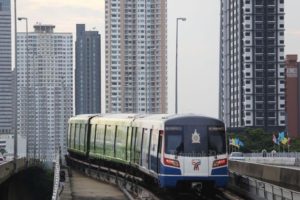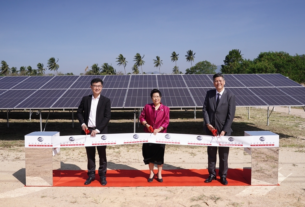
Not every Bangkok Mass transit line is equal
WRITER: James Pitchon
Mass transit has changed residential condominium development patterns in Bangkok combined with the change in social patterns with young people leaving home and buying a property before they get married.
Not every existing mass transit line has proved equally attractive to one-bedroom condominium buyers who form the majority of condominium demand outside of the city centre where most buyers work or study in the downtown Bangkok.
There is a close correlation between passenger numbers on each line and the level of real demand for each location and this will continue to be the case.
The most successful line has been the BTS Light Green and Dark Green Lines with around 740,000 passengers per day followed by the MRT Dark Blue Line with around 310,000 passengers per day then the Airport Rail Link, now operated primarily as a commuter line, with just over 60,000 passengers per day.
The disappointment has been due to the “missing link” to the MRT Dark Blue Line, together with the frequency and speed of trains leading to a longer-than-anticipated journey time to downtown Bangkok.
Around 31,000 condominium units located within 800 metres of a station have been completed along MRT Purple Line and further 24,000 condominium units are under construction as of the second quarter of 2016.
End-user demand for condominium units can potentially be diminished for this location unless the Purple Line can live to buyers’ expectations of providing a convenient journey to downtown Bangkok that is faster and cheaper than taking alternative forms of transport such as your own car, buses or vans.
Potential condominium purchasers are going to become more selective in choosing future mass transit location realising that not all lines are equally attractive and carefully weighing up the trade-off between the total cost of a condominium compared to the time and travel cost of commuting to and from the CBD.
Developers are also going to be more selective both along existing mass transit lines and the future lines that are under construction or being planned.
Proximity to a mass transit station is going to continue to be one of the most important factors in driving midtown and suburban one bedroom condominium demand but it will become more complicated.
Currently, Bangkok has around 120 kilometres of operating mass transit routes with 80 stations. There are 80km of mass transit lines under construction with 54 stations due to be completed by 2020.
The government has accelerated plans for a further 130km with another 92 stations.
Both developers and purchasers will be examining the potential for the new routes in much more detail before making decisions.
James Pitchon is head of research and consulting at CBRE Thailand. Facebook: CBRE.Thailand Twitter: @CBREThailand LinkedIn: CBRE Thailand
Source: http://property.bangkokpost.com/news/1080256/not-every-line-is-equal

